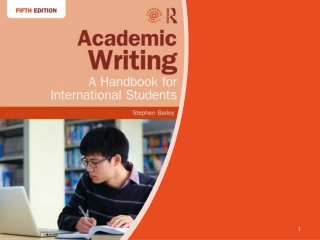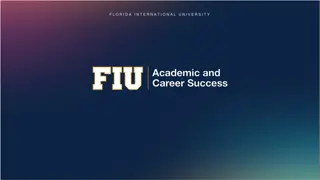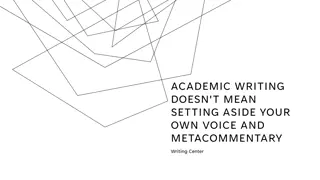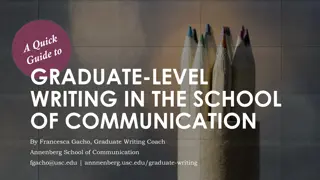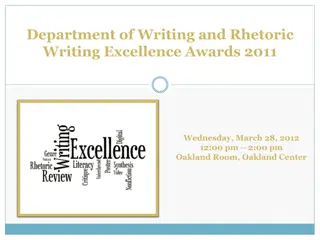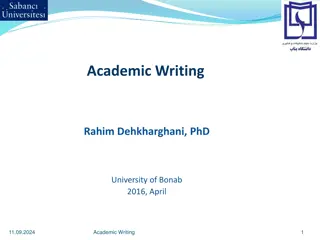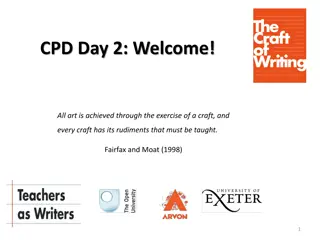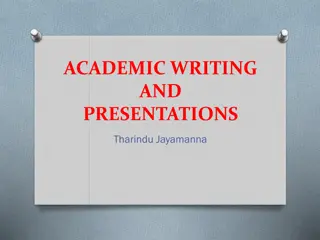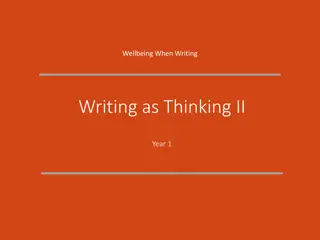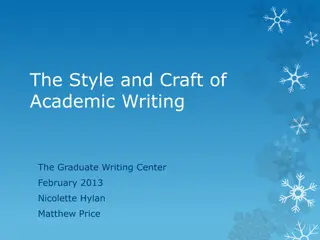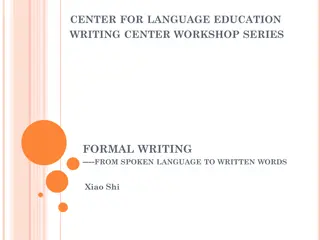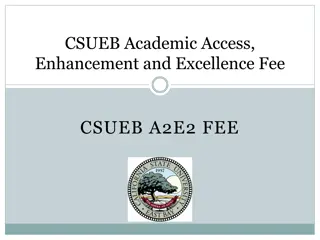Effective Strategies for Academic Writing Excellence
Academic writing for honours requires concise, structured writing supported by evidence from reputable sources. Key tips include organizing points logically, using structured paragraphs, formal language, and avoiding abbreviations. Writing in full words, avoiding personal pronouns, and maintaining formality are essential for academic success.
Download Presentation

Please find below an Image/Link to download the presentation.
The content on the website is provided AS IS for your information and personal use only. It may not be sold, licensed, or shared on other websites without obtaining consent from the author. Download presentation by click this link. If you encounter any issues during the download, it is possible that the publisher has removed the file from their server.
E N D
Presentation Transcript
Academic writing It is a concise, focused and well structured writing which define intellectual boundaries of a particular discipline Its evidence is in a form of references which support what is written to propose theories and ideas It uses of the third-person rather than first-person perspective It has a clear on focus the research problem under investigation, The first step to writing academically is to clearly define the purpose of the writing and the audience
Arrange your points in logical order Have a clear idea of what you want to say Create a list of your main points Think about what the reader needs to know Once you have a clear idea of what is required for your project and you can start planning your research and gathering evidence Find academic information from reliable, reviewed and published resources (journals, books, conference proceedings). Avoid publications from predatory publishers
Write in structured paragraphs Use paragraphs to structure your ideas Each of the points or theme forms a different paragraph From the first or second sentence make your point clear so that a reader can follow the line of reasoning The rest of the paragraph should explain the point or theme in detail and provide relevant evidence/references Evidence can be data, facts, quotations, arguments, statistics, research and theories
Use formal language You are expected to use formal language and not not confrontational or dismissive language Each subject discipline has certain writing styles and terms, that you will be used to as you progress with your degree Do not use of long sentences and complicated vocabulary Avoid using colloquialisms or slang terms or regional dialects
Language Write words out in full rather than shortening them. Instead of writing can t don't or isn't you are expected to write cannot, do not or is not Do not use personal nouns (e.g. I, me, you, us, we) may lead the reader to believe the study was overly subjective
Be concise Only include one main idea per sentence Keep your sentences to a reasonable length Express precisely what you mean Long sentences can be difficult to follow and this may distract from your point Avoid repetition Avoid using redundant words
Summarise work of other writers Summary provides a shortened version of someone else s work. Make sure that you: identify the relevant points depending on your purpose Write a shortened version, in your own words, to show your understanding Include an in-text citation and reference to the original author Revise, edit and proofread your work Most writing will require several drafts and revisions in order to improve the clarity and quality
Conclusion The conclusion brings together the main points Highlights the key results, outputs, message from the project for a reader to take away Identifies gaps or weaknesses or new ideas presented by the study Recommends further research or investigation where appropriate Use the present tense for conclusion
Referencing Cite sources and provide a list of references Citing sources allow readers to identify the resources so they can independently verify and assess the quality of findings and conclusions based on your review of the literature







